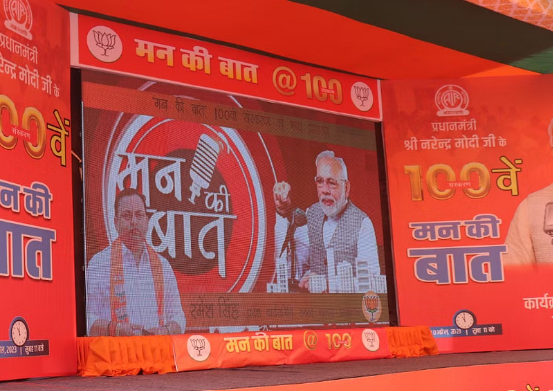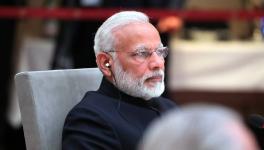Chandigarh: Punishment for Nursing Students for Skipping Mann Ki Baat Draws Criticism

Image for representational purpose. Credit: Prabhat Khabar
New Delhi: On April 30, 2023, the National Institute of Nursing Education, under the umbrella of the Post Graduate Institute of Medical Education and Research (PGIMER) in Chandigarh, hosted the 100th episode of Prime Minister Narendra Modi's radio programme, Mann Ki Baat. However, according to a report published in The Telegraph, at least 36 students were grounded for a week after they failed to attend the event.
Some individuals have criticised the decision, including former PGI director Dr SK Sharma, who stated that the punishment was too harsh.
In response to the incident, the PGIMER administration released a statement on May 11, stating that the decision to ground the students was a "little overreaction." The statement said that the college authorities had been informed of the administration's displeasure and that the issue should not be given any further significance for the greater public good. “Since some of the students did not share any reason for not attending the session and abstained from the event arranged for them in a lecture theatre, the college authorities took action against them,” it said.
“Though it was a slight overreaction on the part of the college authorities and the concerned, have already been conveyed the displeasure of PGIMER administration,” the clarification read.
On Thursday, Dr SK Sharma, former director of PGI, criticised the decision. According to a report published in The Indian Express, he said, "The punishment is too harsh. I don't think it merits such a harsh punishment to the students. The maximum is that they could have been warned. I also think that before the event, the college authorities should have impressed upon the students strictly that was a Mann Ki Baat address to the nation that was supposed to be aired on campus and everyone should positively be in attendance for the same."
The report also mentioned that Manjneek, the president of the PGI Nurses Welfare Association, voiced her opposition, stating that a warning notice of attendance shortage could have been given instead. Manjneek argued that the students are above 17 years old and in a professional college where maintaining discipline is essential.
However, not everyone disagreed with the college's decision. Dr BNS Walia, former director of PGIMER, supported the college's decision, stating that any unauthorised absence usually leads to an extension of the training period. "Yes, it is indiscipline if they were expected to attend an event but failed to do so. And then they can be punished for it," he told The Indian Express.
The National Institute of Nursing Education is known for its competitive entrance exam and rigorous program, with many students coming from middle-class families in rural Punjab. While the students are allowed to go out on weekdays from 5 pm to 8 pm, with longer hours on Sundays, the punishment imposed on the 36 students prevented them from stepping outside the hostel for a week.
On May 29, a letter was issued by the Registrar of PGIMER's Academic Section, informing all teaching department heads that the Institute would be broadcasting the 100th episode of Mann Ki Baat on April 30. The letter requested the heads to relieve residents and students on the date to attend the program, and all heads of departments, unit heads, and residents/students were also requested to attend the same.
However, according to a senior resident at the Institute, there was no compulsion to attend the program. Most residents did not attend, as they were all busy with work, and there was no attendance or repercussion for not being present for the program.
Rajesh Jha and Abha Dev Habib, former members of Delhi University’s executive council, described the nursing college’s action as an assault on the students’ fundamental rights. They told The Telegraph that students cannot be forced to attend such programmes.
Jha believes that forced confinement goes against fundamental rights such as the right to life. He further pointed out that the absence from such events cannot be construed as an act of indiscipline. Jha believes that in higher educational institutions, students should be given the maximum possible freedom to explore themselves, even if it means skipping some events.
On the other hand, Habib thinks that as the elected representative of the people, it is the Prime Minister's responsibility to listen to the demands of students and others. She said that the farmers are protesting for a law that guarantees minimum support prices for their crops, workers are demanding the withdrawal of corporate-friendly labour laws, students and teachers are protesting against the National Education Policy that promotes the privatisation of education, and wrestlers are demanding action against the perpetrators of sexual misconduct. She believes that the Prime Minister must pay heed to their demands.
Habib also thinks that the directive to students to attend the Mann Ki Baat programme compulsorily indicates that the government expects people to behave like mindless herds. She added that it is not the job of students to listen to the Prime Minister, and the government wants to create citizens without autonomy. She believes that such attempts must be resisted. She observed that public-funded institutions are growing increasingly inclined to please the government.
Both Jha and Habib seemed deeply concerned about the issue and see it as a grave threat to the freedom of the students and their right to autonomy.
The issue will likely continue to generate debate and controversy in the coming days.
Get the latest reports & analysis with people's perspective on Protests, movements & deep analytical videos, discussions of the current affairs in your Telegram app. Subscribe to NewsClick's Telegram channel & get Real-Time updates on stories, as they get published on our website.



















